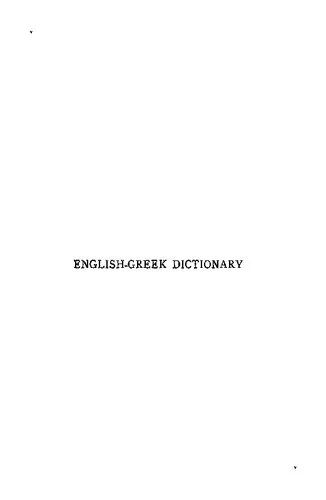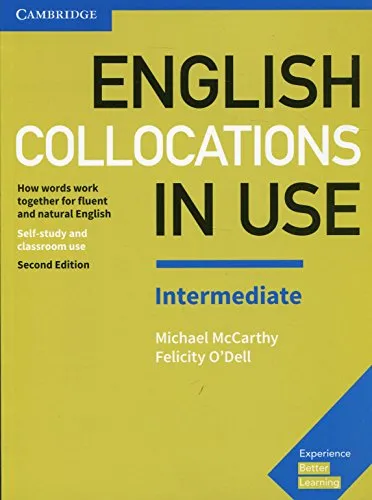Greek-English Lexicon of the Septuagint (Greek Edition)
4.3
بر اساس نظر کاربران

شما میتونید سوالاتتون در باره کتاب رو از هوش مصنوعیش بعد از ورود بپرسید
هر دانلود یا پرسش از هوش مصنوعی 2 امتیاز لازم دارد، برای بدست آوردن امتیاز رایگان، به صفحه ی راهنمای امتیازات سر بزنید و یک سری کار ارزشمند انجام بدینکتاب های مرتبط:
خلاصه تحلیلی کتاب
کتاب Greek-English Lexicon of the Septuagint (Greek Edition) اثری برجسته در حوزه زبانشناسی و مطالعات کتاب مقدس است که توسط نویسندگان J. Lust، E. Eynikel، و K. Hauspie تدوین شده است. این فرهنگنامه با رویکردی علمی و دقیق، واژگان موجود در Septuagint را از منظر زبان یونانی بررسی و معادلهای انگلیسی آنها را ارائه میدهد.
Septuagint که ترجمه یونانی عهد عتیق محسوب میشود، یکی از منابع اساسی برای پژوهشهای تاریخی، الهیاتی و زبانی است. این کتاب به عنوان یک فرهنگنامه تخصصی، نه تنها به معنای لغات بلکه به ریشهشناسی، کاربرد متنی و زمینههای تاریخی واژگان میپردازد. بدین ترتیب پژوهشگر میتواند میان زبان یونانی کهن و برداشتهای متنی پیوندی دقیق برقرار کند.
یکی از نقاط قوت این کتاب، پوشش جامع و سازماندهی منظم مدخلهاست که به پژوهشگر اجازه میدهد در کوتاهترین زمان، اطلاعات دقیق و قابل اعتماد بیابد. مهمتر آنکه این فرهنگنامه نه صرفاً یک ابزار ترجمه، بلکه راهنمایی برای درک عمیقتر مفاهیم و بافتهای متنی نیز هست.
نکات کلیدی و کاربردی
از منظر کاربردی، این اثر برای طیف وسیعی از مخاطبان از جمله دانشجویان الهیات، متخصصان زبانشناسی، و محققان تاریخ باستان مناسب است. آنچه این کتاب را متمایز میکند، قابلیت آن در ترکیب دادههای زبانی با اطلاعات متنی و فرهنگی است.
واژگان ومدخلهای کتاب با مثالهای واقعی از متن Septuagint همراه هستند که به خواننده کمک میکند مفهوم را در سیاق اصلی درک کند. این امر به ویژه برای کسانی که به مطالعات بینفرهنگی و ترجمههای دینی علاقهمندند، ارزشمند است.
این کتاب همچنین با ارائه معادلهای دقیق انگلیسی و توضیحات تکمیلی، به عنوان یک پل ارتباطی میان زبانشناسان یونانی و پژوهشگران انگلیسیزبان عمل میکند. استفاده از آن در پروژههای تحقیقاتی و نگارش مقالات علمی بسیار سودمند خواهد بود.
نقلقولهای ماندگار
هرچند این کتاب ماهیت علمی دارد، اما جملاتی در آن به کار رفتهاند که عمیقاً ارزشمند و الهامبخش بوده و برای پژوهشگران ماندگار خواهند ماند.
این نقلقولها نه تنها رویکرد علمی نویسندگان را نشان میدهد بلکه نگاهشان به پیوند زبان و فرهنگ را نیز آشکار میکند.
شناخت دقیق واژگان، نخستین گام در فهم عمیق متن است. نامشخص
هر مدخل این فرهنگنامه، پلی است میان گذشته و حال زبان. نامشخص
چرا این کتاب اهمیت دارد
اهمیت Greek-English Lexicon of the Septuagint (Greek Edition) را باید در نقش اساسی آن در پژوهشهای میانرشتهای دید. این کتاب برای مطالعات زبان یونانی عهد عتیق و بررسی ترجمهها، ابزاری بیبدیل است.
در جهان معاصر که مطالعات کتاب مقدس ترکیبی از زبانشناسی، تاریخ و الهیات را دربر میگیرد، چنین فرهنگنامههایی امکان تحلیل دقیق و مستند را فراهم میکنند. پژوهشگر با استفاده از این اثر میتواند مقایسههای زبانی عمیق انجام دهد و فهمی تازه از متون مقدس بهدست آورد.
از منظر زبانشناختی، این اثر مرجع به پژوهشگر کمک میکند تا تحولات معنا و ساختار واژگان را در طول قرون بشناسد. از آنجایی که اطلاعات تاریخی و بافت زبانی در یک مرجع جمعآوری شده، دقت پژوهش به شکل چشمگیری افزایش مییابد.
نتیجهگیری الهامبخش
در نهایت، Greek-English Lexicon of the Septuagint (Greek Edition) نه فقط
Analytical Summary
The Greek-English Lexicon of the Septuagint (Greek Edition) stands as a seminal work in the discipline of biblical and linguistic studies, offering a meticulous compilation of vocabulary from the Septuagint translated into English. Edited and authored by J. Lust, E. Eynikel, and K. Hauspie, this lexicon is an indispensable resource for academics, theologians, translators, and serious students of Koine Greek.
The Septuagint, an ancient Greek translation of the Hebrew Bible, holds a central place in the history of early Judaism and Christianity. This lexicon systematically catalogues the words found within the Septuagint corpus, providing nuanced definitions, cross-references, and, where relevant, semantic ranges. For scholars comparing Greek terms with their Hebrew source texts or exploring the linguistic shifts that occurred during the translation process, this reference offers a precision that is rarely matched.
More than a mere word list, the lexicon contextualizes Greek vocabulary within its biblical usage, noting differences from classical Greek and highlighting unique idiomatic expressions. The editors’ expertise ensures philological rigor, making it a trusted resource for textual criticism, theological exegesis, and historical linguistics.
Key Takeaways
Readers will find that the structure and completeness of the Greek-English Lexicon of the Septuagint (Greek Edition) transform the daunting task of engaging with ancient Greek scripture into a manageable, scholarly endeavor.
Among the many benefits are: comprehensive coverage of the Septuagint vocabulary, clear and concise English definitions, careful attention to linguistic nuance, and contextual notes that draw connections with other biblical or extra-biblical sources. The lexicon’s design facilitates both targeted word studies and broader thematic research.
The work also serves as a bridge between disciplines—uniting textual criticism, translation theory, and historical theology—allowing professionals from different fields to engage meaningfully with the original text.
Memorable Quotes
“A lexicon is not merely a tool—it is a doorway into the mind and culture of an ancient world.”Unknown
“To read the Septuagint without a lexicon is to journey without a map.”Unknown
“In every word of the Septuagint, there echoes a history that shapes theology and language alike.”Unknown
Why This Book Matters
The Greek-English Lexicon of the Septuagint (Greek Edition) is more than an academic reference; it is a cornerstone for interdisciplinary scholarship.
For translators, it offers clarity in rendering Greek biblical texts into modern languages without losing the depth of meaning. For historians, it provides a lens through which the evolution of religious thought from Hebrew to Greek contexts can be studied. For theologians, it is a wellspring of interpretive insight anchored in rigorous language analysis.
Its authority stems from years of careful compilation and verification, with each entry contributing to a more accurate and holistic understanding of the Septuagint. As such, it supports both academic instruction and independent scholarly inquiry.
Inspiring Conclusion
The Greek-English Lexicon of the Septuagint (Greek Edition) has earned its place as a trusted companion for anyone dedicated to uncovering the linguistic and theological riches of the ancient scriptures.
Whether you are a professor guiding students through Koine Greek, a translator striving to preserve the texture of sacred texts, or a researcher delving into the interplay of languages in biblical history, this lexicon offers both depth and precision. The journey into the Septuagint is enriched immeasurably when guided by such a meticulously crafted tool.
Take the next step: read, share, and discuss this work with peers; explore its pages with curiosity; and let it illuminate your engagement with the language that shaped much of the theological heritage we know today.
دانلود رایگان مستقیم
شما میتونید سوالاتتون در باره کتاب رو از هوش مصنوعیش بعد از ورود بپرسید
دسترسی به کتابها از طریق پلتفرمهای قانونی و کتابخانههای عمومی نه تنها از حقوق نویسندگان و ناشران حمایت میکند، بلکه به پایداری فرهنگ کتابخوانی نیز کمک میرساند. پیش از دانلود، لحظهای به بررسی این گزینهها فکر کنید.
این کتاب رو در پلتفرم های دیگه ببینید
WorldCat به شما کمک میکنه تا کتاب ها رو در کتابخانه های سراسر دنیا پیدا کنید
امتیازها، نظرات تخصصی و صحبت ها درباره کتاب را در Goodreads ببینید
کتابهای کمیاب یا دست دوم را در AbeBooks پیدا کنید و بخرید
1410
بازدید4.3
امتیاز0
نظر98%
رضایتنظرات:
4.3
بر اساس 0 نظر کاربران
Questions & Answers
Ask questions about this book or help others by answering
No questions yet. Be the first to ask!




